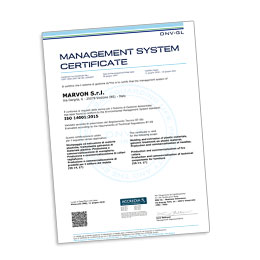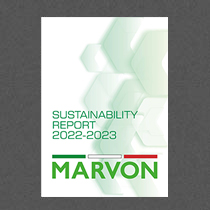Sustainability
Today efficient processes and reliable products are not enough to assess the quality of a company behaviour. Of equal importance are the capacity of a company and its management to design and implement sustainable processes.
implement sustainable processes. The commitment to preserve resources has become today a moral obligation as well as a responsibility and the strong bond between Marvon and its territory, together with the potentialities that can be offered to enterprises by sustainability and responsible economy, gave the green light to a series of activities in this direction.
Sustainability meant in its 3 aspects, environmental, social and economic, plays a fundamental role in Marvon entrepreneurial activities. By means of the implementation of strategical models and with the participation of all the Stakeholders, the company continously sets goals of development and improvement.
“Sustainability” is a word which has now entered everyday language, which is used in many ways and with different meanings. For this reason, despite being oriented towards official definitions such as the World Commission on Environment and Development one, according to which “the sustainable development is the development which satisfies present needs without compromising the possibility of future generations to satisfy theirs”, Marvon wanted to create its own definition reflecting the meaning of this word for us:
“For us sustainability means working, recycling, improving in full respect of environment and people to guarantee future in the most ethical and efficient possible way, thus generating wealth in a sustainable manner”.
Sustainability Report
The gathering of data and facts concerning our everyday commitment finds now place in the first sustainability report, born from the will of establishing a more open dialogue with those getting in touch with us, communicating what has been already done as well as the goals set for the future.
The report illustrates the activities of the period 2022-2023
Sustainability
In March 2007, Marvon reached the important goal of environmental certification according to UNI EN ISO 14001 which is periodically renewed.
Much attention is given to the impact that production activities have on the environment. Marvon is periodically subjected to stringent tests by authorized institutions and has obtained authorization to discharge the water used in galvanization directly into the river. This was made possible thanks to an important investment in a powerful and technological purifier, a cutting-edge facility in water treatment.
The motivation behind the implementation of an environmental management system was the desire to sustainably combine environmental protection and the production requirements of a growing company, with the awareness that the commitment of each one of use is a fundamental condition to maintain and increase our position in the market, but above all to improve the quality of life of present and future generations.
ENVIRONMENTAL CERTIFICATION

The motivations that led Marvon to implement an environmental management system were the desire to sustainably combine environmental protection with the production requirements of a growing company, aware that the commitment of each one of us is a fundamental condition to improve the commercial position on the market but above all to improve the quality of life for present and future generations.
Reaching this important milestone was made possible both due to the commitment of Management that strongly believed in this objective and due to the collaboration of each single employee of the company.
The first phase consists of an initial analysis of company activities and related environmental aspects, in relation to the surrounding territory, taking wastewater, atmospheric emissions, waste, the consumption of resources, the use and possession of dangerous substances, noise emissions, and the influence on traffic into consideration.
The next step involves the planning of the necessary measures for achieving the objectives that the company has set itself. Some such objectives are interventions for energy savings, the reduction in water consumption, and the management of the differentiated collection of rubbish and so on.
The external certification body also verifies the effectiveness of the system in emergencies.

